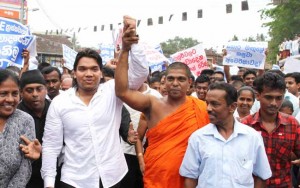Convergence of minds on importance of LLRC
The 19th session of the Human Rights Council in Geneva is seeing Sri Lanka’s implementation of the Lessons Learnt and Reconciliation Commission recommendations taking centre stage. The United States and its western
allies in particular will be presenting a resolution on Sri Lanka. The indications are that the resolution will call on the Sri Lankan government to “implement the constructive recommendations” of its own Lessons Learnt and Reconciliation Commission. The government in response brought out vast numbers of supporters out into the streets to reaffirm that there should be no interference in the internal affairs of Sri Lanka.
The LLRC recommendations which came about through an internal process initiated by the government and nurtured in a home-grown environment is the most effective tool available to the government to respond to any proposed external mechanism. The government has taken steps to implement part of the LLRC recommendations. However closer inspection of what has been done so far will reveal that the preliminary response of the government fails to give adequate weightage to the tone and spirit of the recommendations when put into practice.
The President himself in his Independence Day speech made reference to the LLRC recommendations and committed himself to its implementation, declaring that the government was tracking its findings on the ground. In essence he made a commitment to the entirety of that document and not selectively to parts that were more desirable. There seems to be convergence of minds both in Sri Lanka and in Geneva that the LLRC recommendations hold the key to Sri Lanka’s future.
The National Peace Council believes that while the government seeks to implement the recommendations of its commission it also need to find a way to make the people of Sri Lanka more aware of what the LLRC’s analysis and recommendations are by translating these documents and making them widely available to the general public. We also reiterate that the government should take credible steps to fast track the implementation of the LLRC recommendations in a sincere manner that will negate the need for external attempts to impose a solution. The implementation should also be necessarily tied up to an independent internal mechanism for monitoring progression which could include members of the opposition political parties and civil society in addition to government members.
Governing Council
The National Peace Council is an independent and non partisan organisation that works towards a negotiated political solution to the ethnic conflict in Sri Lanka. It has a vision of a peaceful and prosperous Sri Lanka in which the freedom, human rights and democratic rights of all the communities are respected. The policy of the National Peace Council is determined by its Governing Council of 20 members who are drawn from diverse walks of life and belong to all the main ethnic and religious communities in the country.

